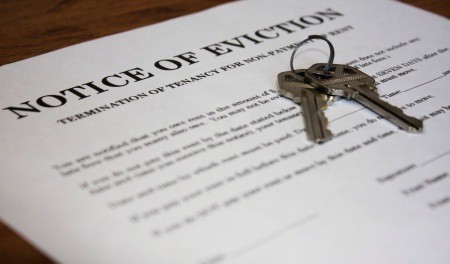Understanding the Role of an Eviction Legal Representative in Home Management Issues
The duty of an eviction legal representative is often ignored in the world of residential property administration, yet their proficiency can be critical in resolving tenant disagreements efficiently. These attorneys browse the elaborate landscape of expulsion laws, ensuring that property owners continue to be compliant with regulations while protecting their interests. From paper preparation to court room representation, eviction lawyers streamline what can be a daunting procedure. The landscape of expulsion legislation is fraught with challenges that can make complex even the most uncomplicated situations. Understanding these intricacies is essential for any kind of property supervisor aiming for effective outcomes.
Value of Expulsion Attorney

Additionally, expulsion legal representatives supply essential assistance in preparing and filing the essential legal papers, such as notifications to abandon and court filings. Their knowledge can significantly improve the expulsion procedure, permitting building managers to focus on various other functional facets of their responsibilities. They can represent residential property supervisors in court, providing a strong case to promote the home proprietor's civil liberties and interests.
In cases of conflicts, having legal depiction can be essential in negotiating settlements or mediating disputes, potentially saving time and resources. Ultimately, involving an eviction attorney not just aids in the effective management of residential property yet likewise works as a protect against prospective legal repercussions, guaranteeing that residential or commercial property management practices remain both legal and effective.
Secret Responsibilities of Expulsion Attorney
Eviction lawyers play an essential role in the residential or commercial property monitoring procedure by supervising numerous legal responsibilities linked with renter evictions. Among their primary obligations is to give legal advice to building managers and landlords, ensuring conformity with state and local legislations regarding occupant rights and expulsions. This includes examining lease agreements to determine potential offenses and grounds for expulsion.
Additionally, eviction legal representatives prepare and file the essential legal papers to initiate eviction procedures. They draft expulsion motions, notices, and problems, ensuring that all documents satisfies lawful criteria. Additionally, they stand for proprietors in court during expulsion hearings, offering evidence and disagreements to support their case.
Expulsion legal representatives likewise play an essential role in working out negotiations in between property managers and occupants, usually seeking to deal with conflicts amicably before they escalate to court. Beyond expulsions, they may assist in matters connected to tenant problems, overdue rental fee, or lease offenses. On the whole, expulsion attorneys supply necessary lawful support that helps building supervisors navigate the complexities of tenant evictions while minimizing potential lawful dangers and making sure a much more efficient home administration process.
Lawful Framework Governing Evictions
The lawful structure regulating evictions is an intricate interaction of federal, state, and local regulations made to secure both tenants and property owners. At the federal level, the Fair Housing Act restricts prejudiced practices in real estate, affecting eviction procedures and making certain equivalent therapy for all lessees. Additionally, the Servicemembers Civil Alleviation Act provides defenses for army workers against expulsion while on active service.
State legislations better specify the eviction procedure, consisting of the factors for expulsion, notification needs, and the timeline for procedures. The majority of states require proprietors to provide written notification specifying the reason for expulsion, such as non-payment of rental fee or lease violations. This notice period see this differs dramatically, with some states permitting just three days and others up to thirty day.
Neighborhood statutes may present additional laws, such as lease control steps or details lessee protections, which property managers have to comply with. These laws collectively develop an organized procedure that intends to balance the civil liberties of property owners with occupant defenses. Understanding this lawful structure is important for eviction lawyers, as it educates their techniques and makes certain conformity with the myriad of policies regulating eviction cases.
Common Difficulties in Expulsion Cases
Navigating the complexities of eviction regulation presents numerous challenges for property owners and their lawyers. One significant obstacle is guaranteeing conformity with state and neighborhood laws, which can differ widely and change regularly. Failure to stick to these laws can cause hold-ups or terminations of eviction proceedings, compeling proprietors to reboot the process.
Another obstacle is the necessity of supplying adequate documents to sustain the eviction. Landlords have to maintain precise documents of lease agreements, repayment backgrounds, and any communication with lessees. Inadequate or badly arranged documents can undermine a proprietor's case, making it critical to have a thorough and systematic approach to record-keeping.

Inevitably, these difficulties highlight the importance of comprehending the legal landscape and preparing effectively to navigate the expulsion process properly, making the role of an eviction attorney essential in these circumstances. - eviction attorney miami
Benefits of Employing an Eviction Legal Representative
Working with an expulsion attorney can significantly enhance the frequently intricate and stressful procedure of removing a renter from a rental home. Among the primary benefits is their knowledge in navigating the legal landscape surrounding evictions. They are skilled in regional regulations and guidelines, making sure that all procedures are adhered to correctly to prevent expensive hold-ups or potential legal risks.
In addition, expulsion legal representatives can manage all essential documentation, from filing the preliminary eviction notice to representing proprietors in court. Their experience enables them to prepare a solid instance, increasing the possibility of a positive end result. This lawful assistance not just conserves time yet additionally alleviates the emotional burden frequently related to eviction proceedings.
Furthermore, an eviction lawyer can provide beneficial recommendations on tenant-related concerns, aiding property owners recognize their responsibilities and legal rights (eviction attorney miami). They can also moderate disagreements, possibly causing a click to read more resolution without the need for court treatment
Final Thought
In summary, eviction lawyers play a vital role in residential or commercial property management by guaranteeing conformity with legal standards and protecting landlords' civil liberties. Their competence in browsing the complexities of expulsion regulations helps with an extra effective resolution of renter conflicts. By preparing necessary paperwork, representing homeowner in court, and discussing settlements, expulsion legal representatives not just streamline the expulsion procedure however additionally alleviate the risks connected with potential legal difficulties. Their participation eventually enhances the general effectiveness of residential property monitoring techniques.
A skilled eviction legal representative aids home supervisors recognize local and state legislations that regulate occupant civil liberties and expulsion treatments, making certain conformity and reducing the risk of costly legal missteps.
Eviction lawyers play an important function in the building monitoring procedure by looking after numerous lawful responsibilities linked with renter expulsions. Generally, eviction attorneys offer important lawful support that assists building supervisors navigate the intricacies of renter expulsions while reducing prospective legal threats and making certain a much more efficient residential property management procedure.

By preparing essential paperwork, representing residential property owners in court, and working out settlements, eviction legal representatives not only improve the eviction procedure yet additionally mitigate the dangers connected with possible lawful challenges.